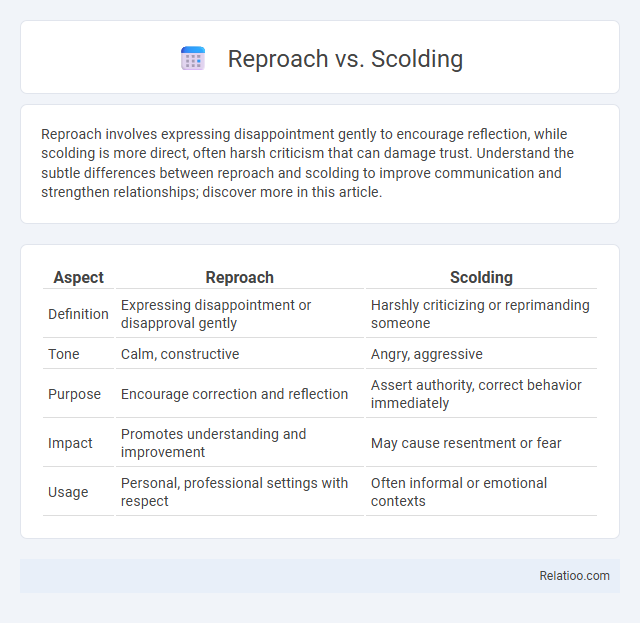Reproach involves expressing disappointment gently to encourage reflection, while scolding is more direct, often harsh criticism that can damage trust. Understand the subtle differences between reproach and scolding to improve communication and strengthen relationships; discover more in this article.
Table of Comparison
| Aspect | Reproach | Scolding |
|---|---|---|
| Definition | Expressing disappointment or disapproval gently | Harshly criticizing or reprimanding someone |
| Tone | Calm, constructive | Angry, aggressive |
| Purpose | Encourage correction and reflection | Assert authority, correct behavior immediately |
| Impact | Promotes understanding and improvement | May cause resentment or fear |
| Usage | Personal, professional settings with respect | Often informal or emotional contexts |
Understanding Reproach and Scolding: Definitions
Reproach and scolding both involve expressing disapproval, but reproach is often gentler, focusing on conveying disappointment or regret, while scolding is more direct and harsh, usually delivered in a reprimanding tone. Understanding the nuances helps you recognize that reproach appeals to emotions and reflection, whereas scolding emphasizes correction and discipline. Clarity in these definitions enhances communication effectiveness, especially in personal and professional relationships.
Key Differences Between Reproach and Scolding
Reproach involves expressing disappointment or mild blame, often highlighting a failure to meet expectations, while scolding signifies a more intense, verbal reprimand aimed at correcting behavior. Reproach is typically calmer and focuses on the emotional aspect of dissatisfaction, whereas scolding tends to be louder, more direct, and authoritative. Understanding these distinctions clarifies communication styles used in personal or professional contexts for addressing wrongdoing.
Emotional Impact of Reproach vs Scolding
Reproach involves expressing disappointment or disapproval gently, often encouraging reflection and growth, whereas scolding is more intense, marked by sharp criticism that can provoke defensiveness or hurt feelings. Your emotional response to reproach may be more constructive, as it tends to focus on behavior rather than personal attack, reducing anxiety and fostering understanding. Scolding, by contrast, often triggers fear or resentment, making it harder to process feedback calmly or positively.
Communication Styles Compared
Reproach involves expressing disappointment or disapproval in a calm and constructive manner, aiming to address behavior while preserving mutual respect. Scolding is a more direct and often harsh form of communication that criticizes or rebukes someone, typically eliciting defensive or negative emotional responses. Comparing these styles, reproach fosters open dialogue and problem-solving, whereas scolding may hinder effective communication by provoking resistance or fear.
Situational Usage: When to Reproach, When to Scold
Reproach is best used in situations requiring calm, constructive criticism aimed at addressing specific behaviors or mistakes, often in professional or reflective contexts. Scolding is appropriate for immediate correction, typically in informal or parental settings, where a firmer tone is needed to curb undesirable actions quickly. Reproof, closely related to reproach, serves as a formal or gentle expression of disapproval suitable for both personal and professional environments when guiding improvement without harsh judgment.
Language and Tone: Subtle vs Direct Approaches
Reproach employs a subtle language and tone that gently signals disappointment or displeasure, often leaving room for reflection and self-correction. Scolding uses a direct, sometimes harsh tone aimed at clearly expressing dissatisfaction or reprimanding behavior, which can create immediate awareness but risks defensiveness. Understanding Your choice between reproach and scolding influences how your message is received and can shape the emotional impact on the listener.
Effects on Relationships and Trust
Reproach often causes subtle damage to relationships by creating feelings of guilt or shame without direct confrontation, leading to decreased trust over time. Scolding tends to produce immediate reactions of defensiveness or resentment, which can erode open communication and weaken relational bonds more abruptly. Reproach combined with scolding intensifies negative emotional responses, significantly impairing trust and hindering healthy relational dynamics.
Cultural Perspectives on Reproach and Scolding
Reproach and scolding differ across cultures in expression and intensity, with reproach often being a subtle, indirect form of expressing disappointment, while scolding tends to be more direct and emotionally charged. In collectivist societies, reproach may be preferred to maintain group harmony and avoid embarrassment, whereas individualistic cultures might accept scolding as a straightforward corrective measure. Understanding these cultural nuances is crucial for effective communication and conflict resolution in diverse social settings.
Constructive Alternatives to Scolding
Reproach and scolding both involve expressing disapproval, but reproach tends to be more measured and reflective, while scolding is often harsh and emotionally charged. Constructive alternatives to scolding include using calm, specific feedback that focuses on behaviors rather than personal attacks, encouraging open dialogue to understand the underlying issues. Employing positive reinforcement and problem-solving strategies fosters a supportive environment that promotes improvement without damaging relationships.
Best Practices for Effective Feedback
Effective feedback balances clarity and empathy, distinguishing between reproach, scolding, and constructive critique to drive improvement. Reproach highlights specific actions or behaviors without personal attacks, while scolding often conveys anger and can hinder communication. To maximize Your impact, focus on clear, objective observations and actionable suggestions that foster growth and maintain respect.

Infographic: Reproach vs Scolding
 relatioo.com
relatioo.com